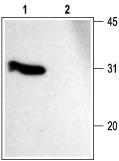Snap25 Rabbit Polyclonal Antibody
Other products for "Snap25"
Specifications
| Product Data | |
| Applications | WB |
| Recommended Dilution | WB: 1:200-1:2000; IHC: 1:100-1:3000 |
| Reactivities | Human, Mouse, Rat |
| Host | Rabbit |
| Clonality | Polyclonal |
| Immunogen | GST fusion protein with the full-length rat SNAP-25 protein. Cytoplasmic. |
| Formulation | Lyophilized. Concentration before lyophilization ~0.8mg/ml (lot dependent, please refer to CoA along with shipment for actual concentration). Buffer before lyophilization: phosphate buffered saline (PBS), pH 7.4, 1% BSA, 0.05% NaN3. |
| Purification | The serum was depleted of anti-GST antibodies by affinity chromatography on immobilized GST, and then IgG fraction was purified on Protein A-Sepharose. |
| Conjugation | Unconjugated |
| Storage | Store at -20°C as received. |
| Stability | Stable for 12 months from date of receipt. |
| Gene Name | synaptosomal-associated protein 25 |
| Database Link | |
| Background | SNAP-25 (or synaptosomal-associated protein of 25kD) is a member of the soluble N-ethylmaleimide-sensitive factor attachment protein receptor (SNARE) protein superfamily. The family includes 36 members in humans and is characterized by the SNARE motif, an evolutionarily conserved stretch of 60–70 amino acids that are arranged in heptad repeats. SNARE proteins are involved in exocytosis and intracellular vesicle trafficking and are essential for cell growth, hormone secretion and neurotransmission, processes that require rapid, targeted, and regulated membrane fusion. SNAREs can be roughly divided into vesicular (v-SNAREs) and target (t-SNAREs) based on their distribution on the transport vesicle or target membrane respectively. Thus, assembly of cognate v-/t-SNAREs between two opposing membranes generates trans-SNARE complexes, which bring the lipid bilayers in close proximity and drive membrane fusion. SNAP-25, unlike most SNAREs, lacks a membrane-spanning region, but is attached to the cytoplasmic side of the plasma membrane by posttranslational modifications such as palmitoylation or farnesylation. SNAP-25 has been extensively studied for its role on neuronal and neuroendocrine cell exocytosis where it functions as one of the plasma membrane protein t-SNARE, which together with the vesicular v-SNARE protein VAMP and another t-SNARE such as Syntaxin 1, forms a trimeric, four-helical complex, which drives fusion of the two opposing bilayers. SNAP-25 is the target of several botulinum neurotoxin (BoNT) types: type A, C and E. The neurotoxins cause specific proteolytic degradation of the SNAP-25 protein, which in turn causes SNARE complex disruption and inhibition of neurotransmitter release. |
| Synonyms | bA416N4.2; dJ1068F16.2; FLJ23079; RIC-4; RIC4; SEC9; SNAP; SNAP-25; SUP |
| Reference Data | |
Documents
| Product Manuals |
| FAQs |
{0} Product Review(s)
0 Product Review(s)
Submit review
Be the first one to submit a review
Product Citations
*Delivery time may vary from web posted schedule. Occasional delays may occur due to unforeseen
complexities in the preparation of your product. International customers may expect an additional 1-2 weeks
in shipping.






























































































































































































































































 Germany
Germany
 Japan
Japan
 United Kingdom
United Kingdom
 China
China



